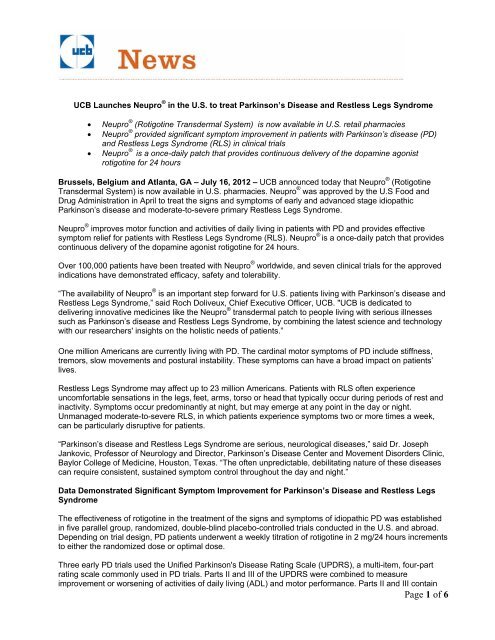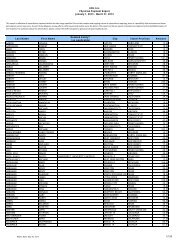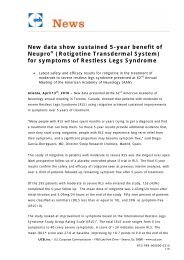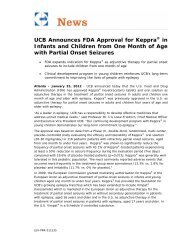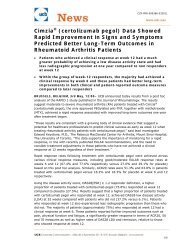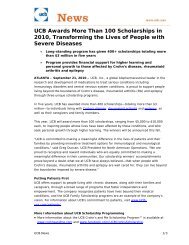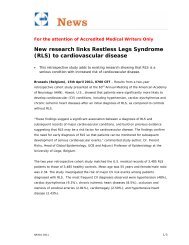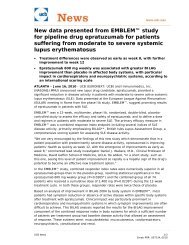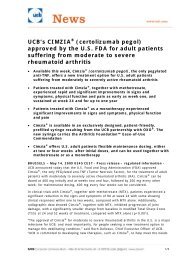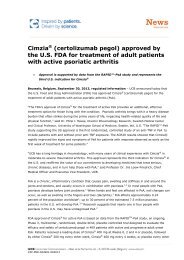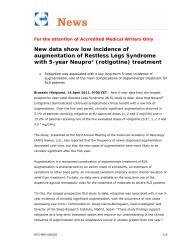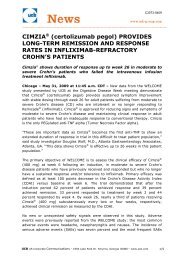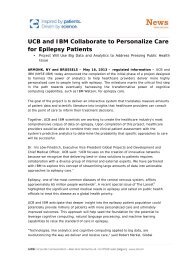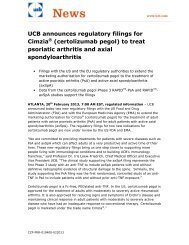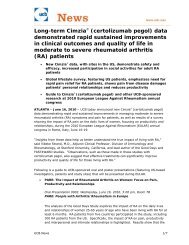US to treat Parkinson's Disease and - UCB
US to treat Parkinson's Disease and - UCB
US to treat Parkinson's Disease and - UCB
Create successful ePaper yourself
Turn your PDF publications into a flip-book with our unique Google optimized e-Paper software.
<strong>UCB</strong> Launches Neupro ® in the U.S. <strong>to</strong> <strong>treat</strong> Parkinson’s <strong>Disease</strong> <strong>and</strong> Restless Legs Syndrome<br />
• Neupro ® (Rotigotine Transdermal System) is now available in U.S. retail pharmacies<br />
• Neupro ® provided significant symp<strong>to</strong>m improvement in patients with Parkinson’s disease (PD)<br />
<strong>and</strong> Restless Legs Syndrome (RLS) in clinical trials<br />
• Neupro ® is a once-daily patch that provides continuous delivery of the dopamine agonist<br />
rotigotine for 24 hours<br />
Brussels, Belgium <strong>and</strong> Atlanta, GA – July 16, 2012 – <strong>UCB</strong> announced <strong>to</strong>day that Neupro ® (Rotigotine<br />
Transdermal System) is now available in U.S. pharmacies. Neupro ® was approved by the U.S Food <strong>and</strong><br />
Drug Administration in April <strong>to</strong> <strong>treat</strong> the signs <strong>and</strong> symp<strong>to</strong>ms of early <strong>and</strong> advanced stage idiopathic<br />
Parkinson’s disease <strong>and</strong> moderate-<strong>to</strong>-severe primary Restless Legs Syndrome.<br />
Neupro ® improves mo<strong>to</strong>r function <strong>and</strong> activities of daily living in patients with PD <strong>and</strong> provides effective<br />
symp<strong>to</strong>m relief for patients with Restless Legs Syndrome (RLS). Neupro ® is a once-daily patch that provides<br />
continuous delivery of the dopamine agonist rotigotine for 24 hours.<br />
Over 100,000 patients have been <strong>treat</strong>ed with Neupro ® worldwide, <strong>and</strong> seven clinical trials for the approved<br />
indications have demonstrated efficacy, safety <strong>and</strong> <strong>to</strong>lerability.<br />
“The availability of Neupro ® is an important step forward for U.S. patients living with Parkinson’s disease <strong>and</strong><br />
Restless Legs Syndrome,” said Roch Doliveux, Chief Executive Officer, <strong>UCB</strong>. "<strong>UCB</strong> is dedicated <strong>to</strong><br />
delivering innovative medicines like the Neupro ® transdermal patch <strong>to</strong> people living with serious illnesses<br />
such as Parkinson’s disease <strong>and</strong> Restless Legs Syndrome, by combining the latest science <strong>and</strong> technology<br />
with our researchers' insights on the holistic needs of patients.”<br />
One million Americans are currently living with PD. The cardinal mo<strong>to</strong>r symp<strong>to</strong>ms of PD include stiffness,<br />
tremors, slow movements <strong>and</strong> postural instability. These symp<strong>to</strong>ms can have a broad impact on patients’<br />
lives.<br />
Restless Legs Syndrome may affect up <strong>to</strong> 23 million Americans. Patients with RLS often experience<br />
uncomfortable sensations in the legs, feet, arms, <strong>to</strong>rso or head that typically occur during periods of rest <strong>and</strong><br />
inactivity. Symp<strong>to</strong>ms occur predominantly at night, but may emerge at any point in the day or night.<br />
Unmanaged moderate-<strong>to</strong>-severe RLS, in which patients experience symp<strong>to</strong>ms two or more times a week,<br />
can be particularly disruptive for patients.<br />
“Parkinson’s disease <strong>and</strong> Restless Legs Syndrome are serious, neurological diseases,” said Dr. Joseph<br />
Jankovic, Professor of Neurology <strong>and</strong> Direc<strong>to</strong>r, Parkinson’s <strong>Disease</strong> Center <strong>and</strong> Movement Disorders Clinic,<br />
Baylor College of Medicine, Hous<strong>to</strong>n, Texas. “The often unpredictable, debilitating nature of these diseases<br />
can require consistent, sustained symp<strong>to</strong>m control throughout the day <strong>and</strong> night.”<br />
Data Demonstrated Significant Symp<strong>to</strong>m Improvement for Parkinson’s <strong>Disease</strong> <strong>and</strong> Restless Legs<br />
Syndrome<br />
The effectiveness of rotigotine in the <strong>treat</strong>ment of the signs <strong>and</strong> symp<strong>to</strong>ms of idiopathic PD was established<br />
in five parallel group, r<strong>and</strong>omized, double-blind placebo-controlled trials conducted in the U.S. <strong>and</strong> abroad.<br />
Depending on trial design, PD patients underwent a weekly titration of rotigotine in 2 mg/24 hours increments<br />
<strong>to</strong> either the r<strong>and</strong>omized dose or optimal dose.<br />
Three early PD trials used the Unified <strong>Parkinson's</strong> <strong>Disease</strong> Rating Scale (UPDRS), a multi-item, four-part<br />
rating scale commonly used in PD trials. Parts II <strong>and</strong> III of the UPDRS were combined <strong>to</strong> measure<br />
improvement or worsening of activities of daily living (ADL) <strong>and</strong> mo<strong>to</strong>r performance. Parts II <strong>and</strong> III contain<br />
Page 1 of 6
13 questions that allow clinicians <strong>to</strong> evaluate aspects of ADL—such as speech, dressing, <strong>and</strong> cutting food<br />
with utensils—<strong>and</strong> 27 questions related <strong>to</strong> the cardinal mo<strong>to</strong>r symp<strong>to</strong>ms in PD patients, tremor, rigidity,<br />
bradykinesia, <strong>and</strong> postural instability. The trials showed rotigotine was effective in helping <strong>to</strong> improve<br />
movement <strong>and</strong> function, versus placebo, in patients with early PD.<br />
Two trials of rotigotine in patients with advanced PD examined change from baseline in “off” time, periods<br />
when the effectiveness of medication wears off <strong>and</strong> PD symp<strong>to</strong>ms return. Statistically significant reductions<br />
in off-times were observed in advanced PD patients receiving rotigotine compared with those who received<br />
placebo.<br />
The efficacy of rotigotine in the <strong>treat</strong>ment of RLS was primarily evaluated in two fixed-dose, r<strong>and</strong>omized,<br />
double-blind, placebo-controlled trials with six-month maintenance periods. Patients received rotigotine<br />
doses ranging from 0.5 mg/24 hours <strong>to</strong> 3 mg/24 hours, or placebo, once daily. In these trials, rotigotine<br />
provided significant RLS symp<strong>to</strong>m improvement versus placebo for RLS patients, as measured by two<br />
widely-accepted <strong>to</strong>ols that allowed patients <strong>and</strong> clinicians <strong>to</strong> assess <strong>and</strong> rank symp<strong>to</strong>m improvement.<br />
The International RLS Study (IRLS) Group rating scale contains 10 items that ask the patient <strong>to</strong> assess on a<br />
scale of zero <strong>to</strong> 40, with zero being absence of RLS symp<strong>to</strong>ms <strong>and</strong> 40 being most severe, the severity of<br />
sensory <strong>and</strong> mo<strong>to</strong>r symp<strong>to</strong>ms, sleep disturbance, daytime somnolence, <strong>and</strong> impact on activities of daily living<br />
<strong>and</strong> mood associated with RLS. The Clinical Global Impression - Improvement scale, or CGI-I, allows the<br />
healthcare provider <strong>to</strong> assess how much the patient's illness has improved or worsened compared <strong>to</strong> a<br />
baseline state established at the beginning of the trial. The scale ranges from 1, very much improved, <strong>to</strong> 7,<br />
very much worse.<br />
In clinical trials, the most common adverse reactions (≥5% greater than placebo) for the highest<br />
recommended doses of Neupro ® for <strong>treat</strong>ment of Parkinson’s disease were nausea, vomiting, somnolence,<br />
application site reactions, dizziness, anorexia, hyperhidrosis, insomnia, peripheral edema, <strong>and</strong> dyskinesia.<br />
The most common adverse reactions (≥5% greater than placebo) for the highest recommended dose of<br />
Neupro ® for <strong>treat</strong>ment of Restless Legs Syndrome were application site reactions, nausea, somnolence, <strong>and</strong><br />
headache.<br />
Neupro ® is available in four different dosage strengths for the signs <strong>and</strong> symp<strong>to</strong>ms of Parkinson’s disease<br />
(2 mg/24 hours, 4 mg/24 hours, 6 mg/24 hours, <strong>and</strong> 8 mg/24 hours). For moderate-<strong>to</strong>-severe primary<br />
RLS, dosing is available in three different dosage strengths (1 mg/24 hours, 2 mg/24 hours, <strong>and</strong> 3 mg/24<br />
hours).<br />
About Parkinson’s disease<br />
Parkinson’s disease develops with the loss of nerve cells in the brain that produce a chemical called<br />
dopamine. The symp<strong>to</strong>ms of PD include both mo<strong>to</strong>r <strong>and</strong> other system involvement <strong>and</strong> can have a broad<br />
impact on patients. As dopamine levels fall, movement (mo<strong>to</strong>r) symp<strong>to</strong>ms—tremors (uncontrollable shaking),<br />
rigidity (stiffness or muscle tensing) <strong>and</strong> bradykinesia (slowness <strong>and</strong> loss of spontaneous movement)—can<br />
progress, along with other underlying symp<strong>to</strong>ms of PD.<br />
About Restless Legs Syndrome<br />
RLS is characterized by unpleasant sensations in the legs <strong>and</strong> an uncontrollable urge <strong>to</strong> move <strong>to</strong> gain relief.<br />
Most people with RLS have difficulty falling asleep <strong>and</strong> staying asleep.<br />
Studies have shown that many patients with RLS may also experience symp<strong>to</strong>ms during the day. Daytime<br />
symp<strong>to</strong>ms of RLS, such as inability <strong>to</strong> sit still <strong>and</strong> involuntary leg jerks, are increasingly recognized. RLS can<br />
result in exhaustion <strong>and</strong> daytime fatigue, <strong>and</strong> may affect daily activities. Patients with moderate-<strong>to</strong>-severe<br />
RLS may require long-term <strong>treat</strong>ment for their RLS.<br />
While the underlying pathophysiology of RLS is not fully unders<strong>to</strong>od, it is thought <strong>to</strong> involve central dopamine<br />
systems. Recent neuroimaging data suggest that RLS patients may carry an abnormality in dopamine<br />
transport that can be visualized both day <strong>and</strong> night.<br />
About Neupro ® in the U.S.<br />
Page 2 of 6
Neupro ® (Rotigotine Transdermal System) is indicated for the <strong>treat</strong>ment of the signs <strong>and</strong> symp<strong>to</strong>ms of<br />
idiopathic Parkinson’s disease <strong>and</strong> moderate-<strong>to</strong>-severe primary Restless Legs Syndrome (RLS). For more<br />
information about Neupro visit www.neupro.com.<br />
Neupro ® in the U.S. Important Safety Information<br />
Neupro ® contains sodium metabisulfite, a sulfite that may cause allergic-type reactions including<br />
anaphylactic symp<strong>to</strong>ms <strong>and</strong> life threatening or less severe asthmatic episodes in certain susceptible people.<br />
Patients <strong>treat</strong>ed with Neupro ® have reported falling asleep while engaged in activities of daily living <strong>and</strong><br />
somnolence. In clinical trials for the highest recommended Neupro ® dose, the incidence of the <strong>treat</strong>ment<br />
difference between Neupro ® <strong>and</strong> placebo for somnolence was 16% for early-stage Parkinson’s disease, 4%<br />
for advanced-stage Parkinson’s disease, <strong>and</strong> 6% for Restless Legs Syndrome. Some patients perceived no<br />
warnings signs, such as excessive drowsiness. Patients should be advised <strong>to</strong> exercise caution while driving,<br />
operating heavy machinery or working at heights during <strong>treat</strong>ment with Neupro ® .<br />
There is an increased risk for hallucinations in patients with advanced-stage Parkinson’s disease <strong>treat</strong>ed with<br />
Neupro ® . In clinical trials for the highest recommended Neupro ® dose, the incidence of the <strong>treat</strong>ment<br />
difference between Neupro ® <strong>and</strong> placebo for hallucinations was 4%, <strong>and</strong> this difference increased with<br />
increasing dose. Patients also may experience new or worsening mental status <strong>and</strong> behavioral changes,<br />
which may be severe, including psychotic-like behavior during Neupro ® <strong>treat</strong>ment or after starting or<br />
increasing the dose of Neupro ® .<br />
Neupro ® may cause symp<strong>to</strong>matic postural/orthostatic hypotension <strong>and</strong> syncope, especially during dose<br />
escalation, elevated blood pressure, elevated heart rate, weight gain <strong>and</strong> fluid retention. Neupro ® should be<br />
used with caution in patients with severe cardiovascular disease.<br />
Case reports suggest that patients can experience intense urges <strong>to</strong> gamble, increased sexual urges, intense<br />
urges <strong>to</strong> spend money, binge eating, <strong>and</strong> other intense urges, <strong>and</strong> the inability <strong>to</strong> control these urges while<br />
taking medications, including Neupro ® , that increase central dopaminergic <strong>to</strong>ne <strong>and</strong> that are generally used<br />
for the <strong>treat</strong>ment of Parkinson’s disease. Patients should be moni<strong>to</strong>red for the development of new or<br />
increased urges while being <strong>treat</strong>ed with Neupro ® . Dose reduction or discontinuation of Neupro ® should be<br />
considered if such urges develop.<br />
Neupro ® may increase the dopaminergic side effects of levodopa <strong>and</strong> may cause <strong>and</strong>/or exacerbate preexisting<br />
dyskinesia. In clinical trials for the highest recommended Neupro ® dose, the incidence of the<br />
<strong>treat</strong>ment difference between Neupro ® <strong>and</strong> placebo for dyskinesia was 7% for advanced-stage Parkinson’s<br />
disease, <strong>and</strong> this difference increased with increasing dose.<br />
Neupro ® can cause application site reactions, <strong>and</strong> some may be severe. In clinical trials for the highest<br />
recommended Neupro ® dose, the incidence of the <strong>treat</strong>ment difference between Neupro ® <strong>and</strong> placebo for<br />
application site reactions was 15% for early-stage Parkinson’s disease, 23% for advanced-stage Parkinson’s<br />
disease, <strong>and</strong> 39% for Restless Legs Syndrome. Most reactions were mild or moderate in intensity <strong>and</strong> were<br />
limited <strong>to</strong> the patch area.<br />
Patients with Parkinson’s disease have a higher risk of developing melanoma than the general population.<br />
Patients should be moni<strong>to</strong>red for melanomas frequently when using Neupro ® .<br />
Dopaminergic medicinal products, including Neupro ® , may cause augmentation <strong>and</strong> rebound in RLS<br />
patients.<br />
The most common adverse reactions (≥5% greater than placebo) for the highest recommended doses of<br />
Neupro ® for <strong>treat</strong>ment of Parkinson’s disease are nausea, vomiting, somnolence, application site reactions,<br />
dizziness, anorexia, hyperhidrosis, <strong>and</strong> insomnia. The most common adverse reactions (≥5% greater than<br />
placebo) for the highest recommended dose of Neupro ® for <strong>treat</strong>ment of Restless Legs Syndrome are<br />
application site reactions, nausea, somnolence, <strong>and</strong> headache.<br />
Additional important safety information for Neupro ® can be accessed at www.neupro.com/pi.<br />
Page 3 of 6
About Neupro ® in the European Union<br />
Neupro ® (rotigotine) is approved in the European Union for the <strong>treat</strong>ment of the signs <strong>and</strong> symp<strong>to</strong>ms of earlystage<br />
idiopathic Parkinson’s disease, as monotherapy (i.e. without levodopa) or in combination with<br />
levodopa, i.e. over the course of the disease, through <strong>to</strong> late stages when the effect of levodopa wears off or<br />
becomes inconsistent <strong>and</strong> fluctuations of the therapeutic effect occur (end of dose or on-off fluctuations).<br />
Neupro ® is also approved in the European Union for the symp<strong>to</strong>matic <strong>treat</strong>ment of moderate <strong>to</strong> severe<br />
idiopathic Restless Legs Syndrome in adults.<br />
Neupro ® in the European Union Important Safety Information<br />
Neupro ® is contraindicated in case of hypersensitivity <strong>to</strong> the active substance or <strong>to</strong> any of its excipients, <strong>and</strong><br />
in case of magnetic resonance imaging (MRI) or cardioversion. Neupro ® should be removed if the patient has<br />
<strong>to</strong> undergo MRI or cardioversion <strong>to</strong> avoid skin burns.<br />
It is recommended <strong>to</strong> moni<strong>to</strong>r blood pressure, especially at the beginning of <strong>treat</strong>ment, due <strong>to</strong> the risk of<br />
postural/orthostatic hypotension associated with dopaminergic therapy <strong>and</strong> reported during Neupro ®<br />
<strong>treat</strong>ment. Neupro ® has been associated with somnolence <strong>and</strong> episodes of sudden sleep onset. Patients<br />
<strong>treat</strong>ed with dopamine agonists including Neupro ® , have been reported pathological gambling, increased<br />
libido <strong>and</strong> hypersexuality. Symp<strong>to</strong>ms suggestive of neuroleptic malignant syndrome have been reported with<br />
abrupt withdrawal of dopaminergic therapy. Therefore it is recommended <strong>to</strong> taper <strong>treat</strong>ment.<br />
Hallucinations have been reported, <strong>and</strong> patients should be informed that hallucinations can occur.<br />
Cases of cardiopulmonary fibrotic complications have been reported in some patients <strong>treat</strong>ed with ergotderived<br />
dopaminergic agents. Neuroleptics given as antiemetic should not be given <strong>to</strong> patients taking<br />
dopamine agonists. Ophthalmologic moni<strong>to</strong>ring is recommended at regular intervals or if vision abnormalities<br />
occur.<br />
External heat, from any source should not be applied <strong>to</strong> the area of the patch. Exposure of a skin rash or<br />
irritation <strong>to</strong> direct sunlight could lead <strong>to</strong> changes in the skin color. If a generalized skin reaction (e.g. allergic<br />
rash) associated with the use of Neupro ® is observed, Neupro ® should be discontinued.<br />
Caution is advised when <strong>treat</strong>ing patients with severe hepatic impairment or acute worsening of renal<br />
function, a dose reduction might be needed.<br />
The incidence of some dopaminergic adverse events, such as hallucinations, dyskinesia, <strong>and</strong> peripheral<br />
oedema generally is higher when given in combination with L-dopa. This should be considered when<br />
prescribing Neupro ® .<br />
Neupro ® contains sodium metabisulphite, a sulphite that may cause allergic-type reactions including<br />
anaphylactic symp<strong>to</strong>ms <strong>and</strong> life threatening or less severe asthmatic episodes in certain susceptible people.<br />
Neupro ® should not be used during pregnancy. Breast-feeding should be discontinued.<br />
In restless legs syndrome augmentation may occur. Augmentation refers <strong>to</strong> the earlier onset of symp<strong>to</strong>ms in<br />
the evening (or even the afternoon), increase in severity of symp<strong>to</strong>ms, <strong>and</strong> spread of symp<strong>to</strong>ms <strong>to</strong> involve<br />
other body parts.<br />
At the beginning of therapy, dopaminergic adverse reactions, such as nausea <strong>and</strong> vomiting, may occur.<br />
These are usually mild or moderate in intensity <strong>and</strong> transient, even if <strong>treat</strong>ment is continued.<br />
Adverse drug reactions reported in more than 10% of Parkinson’s patients <strong>treat</strong>ed with Neupro ® are nausea,<br />
vomiting, application site reactions, somnolence, dizziness <strong>and</strong> headache. The majority of these application<br />
site reactions are mild or moderate in intensity.<br />
Adverse drug reactions reported in more than 10% of RLS patients <strong>treat</strong>ed with Neupro ® are nausea,<br />
application site reactions, asthenic conditions (including fatigue, asthenia, malaise) <strong>and</strong> headache. The<br />
majority of these application site reactions are mild or moderate in intensity.<br />
Page 4 of 6
All Neupro ® supply should be s<strong>to</strong>red in a refrigera<strong>to</strong>r (2o C-8oC). There is no need for patients <strong>to</strong> transport<br />
Neupro ® patches in special containers <strong>and</strong> they must not be s<strong>to</strong>red in a freezer compartment.<br />
Please refer <strong>to</strong> the European Summary of Product Characteristics for full prescribing information (Revised<br />
March 2012):<br />
http://www.ema.europa.eu/ema/index.jsp?curl=pages/medicines/human/medicines/000626/human_med_000<br />
926.jsp&murl=menus/medicines/medicines.jsp&mid=WC0b01ac058001d124<br />
For further information<br />
Andrea Levin, Associate Direc<strong>to</strong>r, Public Relations <strong>and</strong> Communications, <strong>UCB</strong><br />
T +1.770.970.8352, <strong>and</strong>rea.levin@ucb.com<br />
Eimear O’Brien, Direc<strong>to</strong>r, Br<strong>and</strong> Communications, <strong>UCB</strong><br />
T +32.2.559.9271, eimear.obrien@ucb.com<br />
Antje Witte, Inves<strong>to</strong>r Relations, <strong>UCB</strong><br />
T +32.2.559.9414, antje.witte@ucb.com<br />
France Nivelle, Global Communications, <strong>UCB</strong><br />
T +32.2.559.9178, france.nivelle@ucb.com<br />
About <strong>UCB</strong><br />
<strong>UCB</strong>, Brussels, Belgium (www.ucb.com) is a global biopharmaceutical company focused on the discovery<br />
<strong>and</strong> development of innovative medicines <strong>and</strong> solutions <strong>to</strong> transform the lives of people living with severe<br />
diseases of the immune system or of the central nervous system. With more than 8,500 people in about 40<br />
countries, the company generated revenue of EUR 3.2 billion in 2011. <strong>UCB</strong> is listed on Euronext Brussels<br />
(symbol: <strong>UCB</strong>).<br />
Forward looking statements<br />
This press release contains forward-looking statements based on current plans, estimates <strong>and</strong> beliefs of<br />
management. All statements, other than statements of his<strong>to</strong>rical fact, are statements that could be deemed<br />
forward-looking statements, including estimates of revenues, operating margins, capital expenditures, cash,<br />
other financial information, expected legal, political, regula<strong>to</strong>ry or clinical results <strong>and</strong> other such estimates<br />
<strong>and</strong> results. By their nature, such forward-looking statements are not guarantees of future performance <strong>and</strong><br />
are subject <strong>to</strong> risks, uncertainties <strong>and</strong> assumptions which could cause actual results <strong>to</strong> differ materially from<br />
those that may be implied by such forward-looking statements contained in this press release. Important<br />
fac<strong>to</strong>rs that could result in such differences include: changes in general economic, business <strong>and</strong> competitive<br />
conditions, the inability <strong>to</strong> obtain necessary regula<strong>to</strong>ry approvals or <strong>to</strong> obtain them on acceptable terms,<br />
costs associated with research <strong>and</strong> development, changes in the prospects for products in the pipeline or<br />
under development by <strong>UCB</strong>, effects of future judicial decisions or governmental investigations, product<br />
liability claims, challenges <strong>to</strong> patent protection for products or product c<strong>and</strong>idates, changes in laws or<br />
regulations, exchange rate fluctuations, changes or uncertainties in tax laws or the administration of such<br />
laws <strong>and</strong> hiring <strong>and</strong> retention of its employees. <strong>UCB</strong> is providing this information as of the date of this press<br />
release <strong>and</strong> expressly disclaims any duty <strong>to</strong> update any information contained in this press release, either <strong>to</strong><br />
confirm the actual results or <strong>to</strong> report a change in its expectations.<br />
There is no guarantee that new product c<strong>and</strong>idates in the pipeline will progress <strong>to</strong> product approval or that<br />
new indications for existing products will be developed <strong>and</strong> approved. Products or potential products which<br />
are the subject of partnerships, joint ventures or licensing collaborations may be subject <strong>to</strong> differences<br />
between the partners. Also, <strong>UCB</strong> or others could discover safety, side effects or manufacturing problems<br />
with its products after they are marketed.<br />
Moreover, sales may be impacted by international <strong>and</strong> domestic trends <strong>to</strong>ward managed care <strong>and</strong> health<br />
care cost containment <strong>and</strong> the reimbursement policies imposed by third-party payers as well as legislation<br />
affecting biopharmaceutical pricing <strong>and</strong> reimbursement.<br />
Page 5 of 6
###<br />
Page 6 of 6


